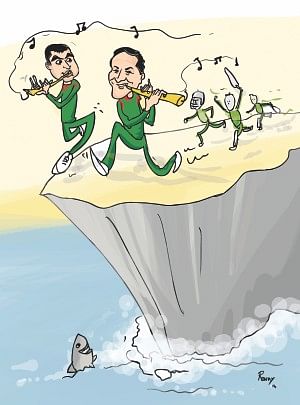Time to stop the rot
Time to stop the rot

Make no mistake about it, Bangladesh cricket is in a state of emergency. If the BCB were governing a country, its charge would be declared a failed state. Take a look at the events that have led to the inexcusable fiasco which saw Bangladesh unable -- unwilling may be a better word -- to chase 106 in 41 overs against a second-string India.
In the World Twenty20 at home Bangladesh went down to a motley crew of part-timers from Hong Kong chasing a similar target. A month before, they lost an ODI to Sri Lanka after reducing the to-be T20 world champions to 67 for eight. In the match following that ODI loss to Sri Lanka, Shakib Al Hasan insulted millions of his adoring fans, children included, by making a vulgar gesture on live television. The subsequent three-match ban did not give him much pause -- during the World Twenty20 he gave an interview, against the code of conduct for participants in an ongoing event, containing many controversial statements. Then he did the unthinkable in the first ODI of the current series against India by going into the crowd and physically assaulting two spectators who were teasing his wife.
Meanwhile, Tamim Iqbal has been suffering a prolonged patch of bad form -- you of course would not be able to tell by his batting approach during the second ODI -- but continues to be picked in the vital opening position. The backdrop has merely been that Bangladesh have suffered their ninth straight ODI defeat, including one against Afghanistan.
Something clearly is not right with Bangladesh cricket. The current shambles can no longer be seen as a mere blip on the radar but as the death throes of a team culture nearing its sordid nadir. Clearly a philosophy has died -- a philosophy that saw many of the same cricketers pull off remarkable wins against Sri Lanka, West Indies, India (full-strength) and New Zealand between 2012 and the end of 2013. It goes without saying that if the BCB are to salvage anything from the wreckage -- never mind the 2015 World Cup, but for the longer term -- major changes have to be made.
Having detailed the list of wrongs the Bangladesh cricketers have inflicted on an untiringly loyal public -- the only aspect of Bangladesh cricket that is the genuine envy of the rest of the sporting world -- let us dwell on the consequences they suffered. After losses to Afghanistan in the Asia Cup, Hong Kong in a World Twenty20 where their only victories came against Afghanistan and Nepal, the BCB president said there would not be any sea changes. In other words, 'let us put a latticework of band aids over the gaping crack in the sinking ship, we should be okay'. Unsurprisingly, the crack has widened. Shakib's latest and most shameful indiscretion has been met with the board CEO saying that they will look into the matter after the series. So whatever plan of action they decide upon, the immediate message they have sent once again is that it is okay to behave that way, especially if you are perceived to be the heart and soul of the team. These are the perceptions that should now be challenged.
Tamim must now be dropped -- his recklessness on Tuesday shows that he neither has the mental skill nor, currently, the physical ability to perform. His confusion at the top of the order has been shown on multiple occasions to infect the more impressionable of his colleagues lower down.
And while it may be sacrilege to suggest a similar course of action on Shakib -- blessed as he is with founts of natural talent -- the cold, hard evidence points in another direction. Since the Asia Cup in 2012 Bangladesh have won eight of 23 ODIs; Shakib Al Hasan has played in only one of them -- the first ODI in Zimbabwe more than a year ago when he scored one and gave away 27 runs in three wicketless overs with the ball. No one will doubt his quality as a player or his contributions on the field, but whether his value to the team has been overestimated of late is a more complex question. One may go as far as to question whether his presence is a negative one -- not as preposterous a claim as it may first seem when you consider that a dressing room full of youngsters look up to him and see a senior behaving whichever outrageous way he wants, with nary a thought to consequences or team discipline.
Bangladesh's steep fall in 2014 has at its roots -- and it is borne out in the results, particularly the spectacular implosions in matches they should have won -- an erosion of the values of a team which once sought to win matches through a concerted struggle and one that did not serially chuck away hard-fought winning positions. It must now be asked how big a role these two superstars of the team have had in the erosion of those qualities.
As a nation, oppressed by hardship and bad politics as we are, we often tell ourselves that we do not deserve better. That is perhaps at the root of our undying encouragement for our beloved Tigers, and may similarly be the reason for the selectors' persistence with dysfunctional elements. That is the attitude that gave us Mohammad Ashraful. Perhaps it is time we tell ourselves that we deserve better.